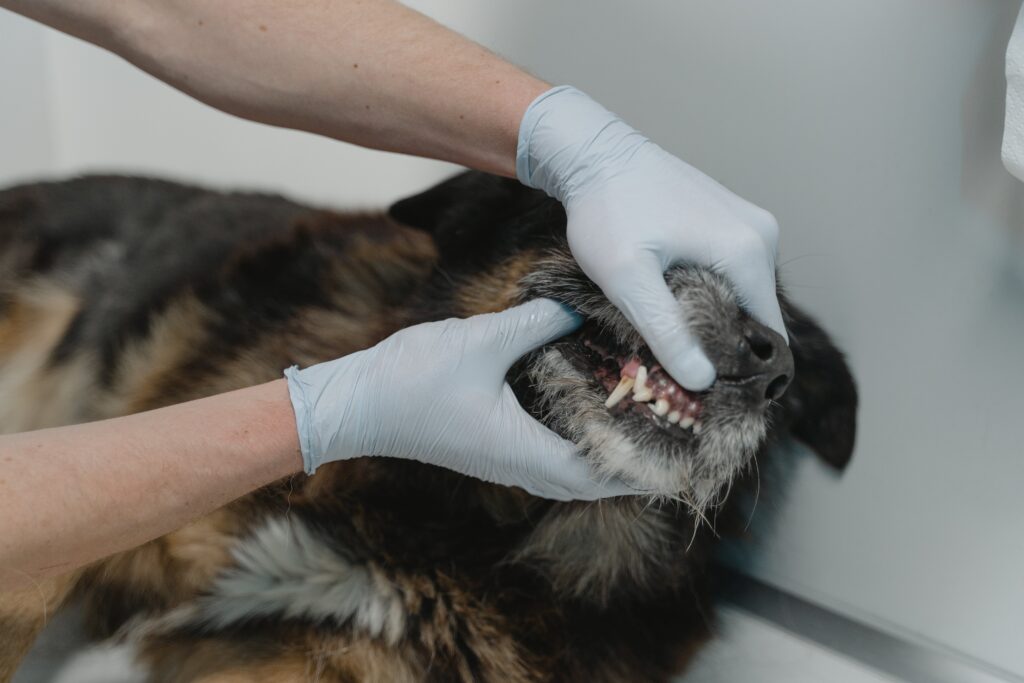Proper dental care is essential for your dog’s overall health and well-being. Neglecting your dog’s teeth can lead to various dental problems and even affect their overall health. In this blog post, we will discuss some important tips for taking care of your dog’s teeth.
Regular Brushing
Regular brushing is essential for maintaining your dog’s dental health. By incorporating regular brushing into your dog’s routine, you can prevent various dental issues such as plaque buildup, tartar, bad breath, and gum disease. Here are some tips to help you establish a regular brushing routine for your dog.
Brush your dog’s teeth regularly using a dog-specific toothbrush and toothpaste.
It is important to use a toothbrush and toothpaste specifically designed for dogs. Human toothpaste can be harmful to dogs as it contains ingredients that are toxic to them. Dog toothbrushes are usually smaller and have softer bristles that are gentle on your dog’s gums and teeth.
When introducing brushing to your dog, start by getting them comfortable with the toothbrush. Allow them to sniff and lick it so they can become familiar with the object. Gradually, start brushing their teeth for short durations, ensuring you reach all areas of their mouth.
Start slowly and gradually increase the duration of brushing sessions.
At the beginning, your dog may resist or become nervous during brushing sessions. It’s important to be patient and make it a gradual process. Start with short brushing sessions, around 30 seconds to a minute, and gradually increase the time as your dog becomes more comfortable.
You can also incorporate playtime or a favorite activity into brushing sessions to distract and relax your dog. This will make the experience more enjoyable for them and help build a positive association with brushing.
Make it a positive experience by rewarding your dog with treats or praise.
Positive reinforcement is a great way to encourage your dog to accept brushing. After each successful brushing session, reward your dog with praise, treats, or a favorite toy. This will create a positive association with brushing and motivate your dog to cooperate during future sessions.
Remember to be patient and consistent with your dog’s brushing routine. Aim to brush their teeth at least two to three times a week. Regular brushing, combined with professional dental cleanings as recommended by your veterinarian, will help ensure your dog’s oral health and overall well-being.
Provide Dental Chews and Toys
In addition to regular brushing, providing your dog with dental chews and toys is an excellent way to promote their dental health. These specially designed chews and toys help remove plaque and tartar buildup, keeping your dog’s teeth clean and healthy. Here are some tips for choosing the right dental chews and toys for your furry friend.
1. Choose the Right Products
When selecting dental chews and toys for your dog, it’s crucial to choose products that are safe and appropriate for their size and chewing habits. Look for chews and toys that are specifically marketed for dental care and have positive reviews. Make sure to read the product labels and choose ones that are made from safe and durable materials.
2. Consider Your Dog’s Size and Chewing Strength
Every dog is unique, and their dental needs may vary depending on their size and chewing strength. If you have a small dog, opt for smaller-sized chews and toys that they can comfortably handle. On the other hand, if you have a larger dog or a powerful chewer, choose larger and more robust options that can withstand their chewing habits.
3. Look for Dental Benefits
Not all dental chews and toys are created equal. Some are simply designed for entertainment, while others have specific dental benefits. Look for products that are scientifically proven to help remove plaque and tartar. These may have special grooves, textures, or ingredients that contribute to better dental hygiene. The packaging or product description should clearly state the dental benefits.
4. Prioritize Safety
Safety should be your top priority when selecting dental chews and toys for your dog. Avoid products with small parts that could be a choking hazard. Additionally, be wary of chews that are extremely hard or brittle as they can potentially damage your dog’s teeth. If you’re unsure about a particular product, consult with your veterinarian for guidance.
5. Rotate the Chews and Toys
While dental chews and toys are great for your dog’s oral health, they should not be the only method of dental care. To ensure your dog receives balanced oral hygiene, it’s important to rotate different types of chews and toys. This will keep your dog engaged and prevent boredom. Consider having a variety of textures, shapes, and sizes to cater to your dog’s preferences.
6. Supervise Chewing Sessions
Always supervise your dog during chewing sessions, especially with new chews or toys. This allows you to monitor their behavior, ensure they’re using the product correctly, and intervene if necessary. If you notice any signs of discomfort, stop the chewing session immediately and inspect the chew or toy for any damages.
In conclusion, providing dental chews and toys is an effective way to improve your dog’s oral health. By choosing the right products, considering your dog’s size and chewing habits, prioritizing safety, and rotating the chews and toys, you can help maintain your dog’s dental hygiene between brushing sessions. Remember to always consult with your veterinarian for personalized recommendations and advice.
Regular Vet Check-ups
Regular check-ups with your veterinarian are essential to ensure the overall health and well-being of your pet. When it comes to dental health, these check-ups become even more important. Dental issues can often go unnoticed and lead to serious health problems if left untreated. By scheduling regular dental check-ups, you can prevent potential problems and keep your pet’s teeth in top condition.
Schedule regular dental check-ups with your veterinarian
The first step in maintaining good dental health for your pet is to schedule regular dental check-ups with your veterinarian. Just like humans, animals also require professional dental care to keep their teeth and gums healthy. Your veterinarian will thoroughly examine your pet’s teeth, gums, and oral cavity during these check-ups.
During the dental check-ups, your vet may recommend a professional dental cleaning if necessary. This procedure involves removing plaque and tartar buildup from your pet’s teeth, both above and below the gumline. Professional dental cleanings are performed under anesthesia to ensure your pet is comfortable and to allow for a thorough examination and cleaning.
Your vet can perform professional dental cleanings and identify any dental issues early on
Professional dental cleanings done by your veterinarian are essential for maintaining your pet’s dental health. These cleanings can remove plaque, tartar, and bacteria that regular brushing and homecare cannot eliminate. Additionally, your vet will be able to identify any dental issues early on, such as cavities, gum disease, or oral tumors.
Early detection of dental issues is crucial as it allows for prompt treatment and prevents further complications. Your vet may recommend additional dental treatments such as tooth extractions, periodontal therapy, or the use of dental sealants to protect your pet’s teeth.
Follow your vet’s advice regarding dental care and treatments
After the dental check-up, your veterinarian will provide you with advice and recommendations for your pet’s dental care. It is essential to follow their advice to ensure proper dental hygiene. Your vet may recommend a specific dental care routine that includes regular brushing, the use of dental chews, or a special diet.
Additionally, if your vet identifies any dental issues during the check-up, they may recommend specific treatments or procedures to address them. It is crucial to follow through with these recommendations to prevent further dental problems and maintain your pet’s overall health.
In conclusion, regular dental check-ups with your veterinarian are essential for maintaining your pet’s dental health. These check-ups allow for professional dental cleanings, early detection of dental issues, and personalized advice for proper dental care. By following your vet’s recommendations, you can ensure that your pet’s teeth and gums remain healthy, preventing potential complications and ensuring their overall well-being.
Monitor Your Dog’s Diet
Proper nutrition is essential for your dog’s overall health and well-being. By monitoring your dog’s diet, you can ensure that they receive a balanced diet that promotes dental health and prevents dental problems such as plaque and tartar buildup. Here are some important tips to keep in mind:
Feed your dog a balanced diet that promotes dental health
A balanced diet plays a crucial role in maintaining your dog’s dental health. Make sure to provide them with a high-quality dog food that contains the necessary nutrients for strong teeth and gums. Look for products that are specifically formulated to promote dental health, as they often contain ingredients that can help clean your dog’s teeth as they eat. These foods are designed to reduce plaque and tartar buildup and prevent dental problems.
Additionally, incorporating raw or natural bones into your dog’s diet can also help promote dental health. Chewing on bones helps remove plaque and tartar from their teeth, providing them with a natural way to keep their teeth clean and healthy. However, it’s important to consult with your veterinarian before introducing bones into your dog’s diet to ensure they are safe and appropriate for your dog’s breed and size.
Avoid feeding them excessive sugary or sticky foods
Sugary or sticky foods can be detrimental to your dog’s dental health. These types of foods can easily stick to their teeth, leading to the development of plaque and tartar. Avoid giving your dog treats that are high in sugar or contain artificial sweeteners, as these can not only contribute to dental problems but also lead to weight gain and other health issues.
It’s also important to avoid feeding your dog human foods that are sticky or sugary, such as candies or pastries. These foods are not only unhealthy for them but can also cause dental issues. Stick to dog-friendly treats that are designed to promote dental health and are free from harmful ingredients.
Certain dental diets or treats can help reduce plaque and tartar buildup
There are specific dental diets or treats available that are designed to reduce plaque and tartar buildup in dogs. These products usually have a unique texture or formulation that helps scrub away plaque and tartar as your dog chews on them. Additionally, some dental treats contain enzymes or other active ingredients that further promote dental health.
When choosing dental diets or treats for your dog, look for products that are approved by veterinary professionals and have a seal of approval from reputable organizations. It’s also important to consider your dog’s specific needs and preferences, as some products may be more suitable for certain breeds or sizes.
Remember, regular dental check-ups and professional cleanings are essential to your dog’s dental health. Consult with your veterinarian to establish a dental care routine that suits your dog’s needs and to ensure their teeth and gums remain in optimal condition.
By monitoring your dog’s diet and providing them with proper nutrition, you can help prevent dental problems and promote their overall health and well-being. Follow these tips to keep your dog’s teeth clean and their smiles bright!
Recognize Signs of Dental Problems
Dental problems are a common health issue among pets, and it is essential for pet owners to be vigilant and recognize the signs. As a pet owner, it is your responsibility to ensure that your furry friend maintains good oral hygiene to prevent further complications. By being aware of the signs of dental problems, you can take the necessary steps to address them and improve your pet’s dental health.
Be Aware of Signs of Dental Problems
One of the first signs of dental problems in pets is bad breath. If you notice that your pet has unusually foul breath, it may be an indication of dental issues. Other signs to look out for include swollen gums and difficulty eating or chewing their food. Pets with dental problems may also drool excessively or show signs of pain or discomfort.
It is important to note that dental problems can vary in severity, ranging from mild plaque buildup to more serious conditions such as gum disease or tooth decay. Regularly inspecting your pet’s teeth and gums can help you identify any potential issues early on, preventing them from escalating into more significant problems.
Consult Your Veterinarian for Proper Diagnosis and Treatment
If you notice any signs of dental problems in your pet, it is crucial to consult your veterinarian for a proper diagnosis and treatment plan. Your vet will examine your pet’s teeth and gums and may recommend a dental cleaning or other necessary procedures to address the dental issues.
It is important to remember that attempting to treat dental problems at home without professional guidance can be risky and may worsen the situation. Your veterinarian has the knowledge and expertise to provide the best care for your pet’s dental health, so it is essential to follow their advice and recommendations.
Early Detection and Treatment Can Prevent Further Complications
Early detection and treatment of dental problems can help prevent further complications. Dental issues, if left untreated, can lead to tooth loss, infections, and even more severe health problems affecting the heart, kidneys, and other organs.
By addressing dental problems promptly, you can ensure that your pet maintains healthy teeth and gums, facilitating their overall well-being. Regular dental check-ups and cleanings, along with proper at-home dental care, can go a long way in preventing major dental issues and keeping your pet’s teeth strong and healthy.
In conclusion, as a responsible pet owner, it is crucial to recognize the signs of dental problems in your furry friend. By being aware of the signs and seeking early veterinary intervention, you can protect your pet’s dental health and prevent further complications. Remember, prevention is key, so prioritize regular dental care to keep your pet’s smile bright and healthy!
Conclusion
Taking care of your dog’s teeth is crucial for their overall health and well-being. By following these tips and maintaining a good dental care routine, you can help prevent dental problems and ensure your dog has a healthy smile. Remember to consult your veterinarian for personalized advice and recommendations.
TL;DR
Taking care of your dog’s teeth is essential for their health. Follow these tips and consult your vet for personalized advice.
Keeping your dog’s teeth clean and healthy is an important part of their overall well-being. Just like humans, dogs can suffer from dental problems such as plaque buildup, gum disease, and tooth decay. These issues not only cause discomfort and pain for your furry friend but can also lead to more serious health problems if left untreated.
To ensure your dog has a healthy smile and a happy life, it’s important to establish a regular dental care routine. Here are some tips to help you take care of your dog’s teeth:
1. Brush Your Dog’s Teeth
Brushing your dog’s teeth is one of the most effective ways to prevent dental problems. Use a dog-specific toothbrush and toothpaste to gently brush their teeth at least two to three times a week. Start slow and gradually increase the amount of brushing over time to get your dog comfortable with the process.
2. Provide Dental Chews and Toys
Dental chews and toys can help remove plaque and tartar from your dog’s teeth while providing them with entertainment. Look for options that are specifically designed to promote dental health and choose the appropriate size for your dog.
3. Feed a Balanced Diet
A balanced diet is essential for your dog’s overall health, including their dental health. Avoid feeding them excessive amounts of sugary or starchy foods, as these can contribute to plaque buildup. Instead, opt for high-quality dog food that is rich in nutrients.
4. Schedule Regular Veterinary Check-ups
Regular dental check-ups with your veterinarian are crucial for maintaining your dog’s oral health. They can perform professional cleanings, identify any potential dental issues, and provide personalized advice for your dog’s specific needs.
5. Be Alert to Signs of Dental Problems
Watch out for signs of dental problems, such as bad breath, swollen or bleeding gums, difficulty eating, or loose teeth. If you notice any of these signs, seek veterinary care as soon as possible to prevent further complications.
In conclusion, taking care of your dog’s teeth is essential for their overall health and well-being. By following these tips and maintaining a good dental care routine, you can help prevent dental problems and ensure your dog has a healthy smile. Remember to consult your veterinarian for personalized advice and recommendations.



